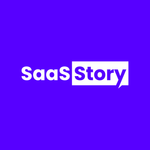Darwinbox: The Asian Answer to Global HR Challenges

“When Darwinbox started, everyone laughed at us. They said, these guys can’t compete against SAP and Oracle.”
Chaitanya Peddi, Co-Founder, Darwinbox
They started out in 2015, three friends with big questions and open minds. How could HR stop being a tangle of spreadsheets, emails, and delays? Why should an employee’s life at work, from hiring and onboarding to exit, feel like jumping through hoops?
Chaitanya Peddi, Jayant Paleti, and Rohit Chennamaneni first saw the cracks in the system. They had worked in consulting, investment banking, and operations, and witnessed how finance and sales teams could run on insightful data. But HR? That often felt messy and ignored.
This thought propelled them to build Darwinbox in Hyderabad. At first, many ridiculed and questioned their ability to take on giants like SAP and Oracle. Others wondered how they would handle global scale. But cynicism did not deter the trio from following their dream.
They kept going; and focused on solving the problems they themselves had seen. They made things mobile by creating a platform that would cover the entire employee journey. Over time, another founder, Vineet Singh, joined in. He joined as CTO, but was elevated to Co-founder later on.
Step by step, milestone by milestone, Darwinbox grew. First, it conquered HR tech in India, and then expanded in South-East Asia, the Middle East, and North America. They raised money, acquired more clients, and included different modules, all while earning their clients’ trust.
This is the story of how four people turned a simple idea into a tool used by HR departments across countries. We’ll also learn about how they met doubt with persistence and traded hype for execution.
What Is Darwinbox?
At its heart, Darwinbox is a cloud-based Human Capital Management (HCM) platform designed to modernize the way companies handle their people processes.
From recruitment and onboarding to payroll, performance management, and employee engagement, the platform offers a comprehensive suite that goes beyond basic HR tools.
Unlike legacy systems built for Western markets, Darwinbox was conceived with an Asia-first mindset, tailoring its features to the cultural and organizational nuances of this region.
As co-founder Chaitanya Peddi explained in an interview, “The companies are different, the workforce is different. There are cultural nuances, socioeconomic nuances...HR, unlike a lot of other functions, is very culture driven.”
This philosophy helped Darwinbox carve out its identity by solving pain points unique to Asian businesses. However, this sharp regional focus was also a risk.
Many investors were initially hesitant, unsure whether building for Asia before expanding globally was the right bet.
To this, Jayant Paleti explained that Asia has a unique mix of decades-old conglomerates, new high-growth enterprises, millennial-heavy populations, regional multinationals, and diversity of languages and cultures. Therefore, for Darwinbox, building with usability and configurability was at the core of everything they did.
Over time, the platform has expanded far beyond basic HR tools. Today, it includes an all-in-one reporting and analytics engine, giving organizations insights instead of just storing data. It has also rolled out integrations with Microsoft Teams, which allows employees to apply for leave, send birthday wishes, or check HR updates within the app.
In recent years, a significant chunk of Darwinbox’s R&D has gone into artificial intelligence, resulting in a virtual assistant that can answer HR queries, capture real-time feedback, or help recognize colleagues through a simple chat.
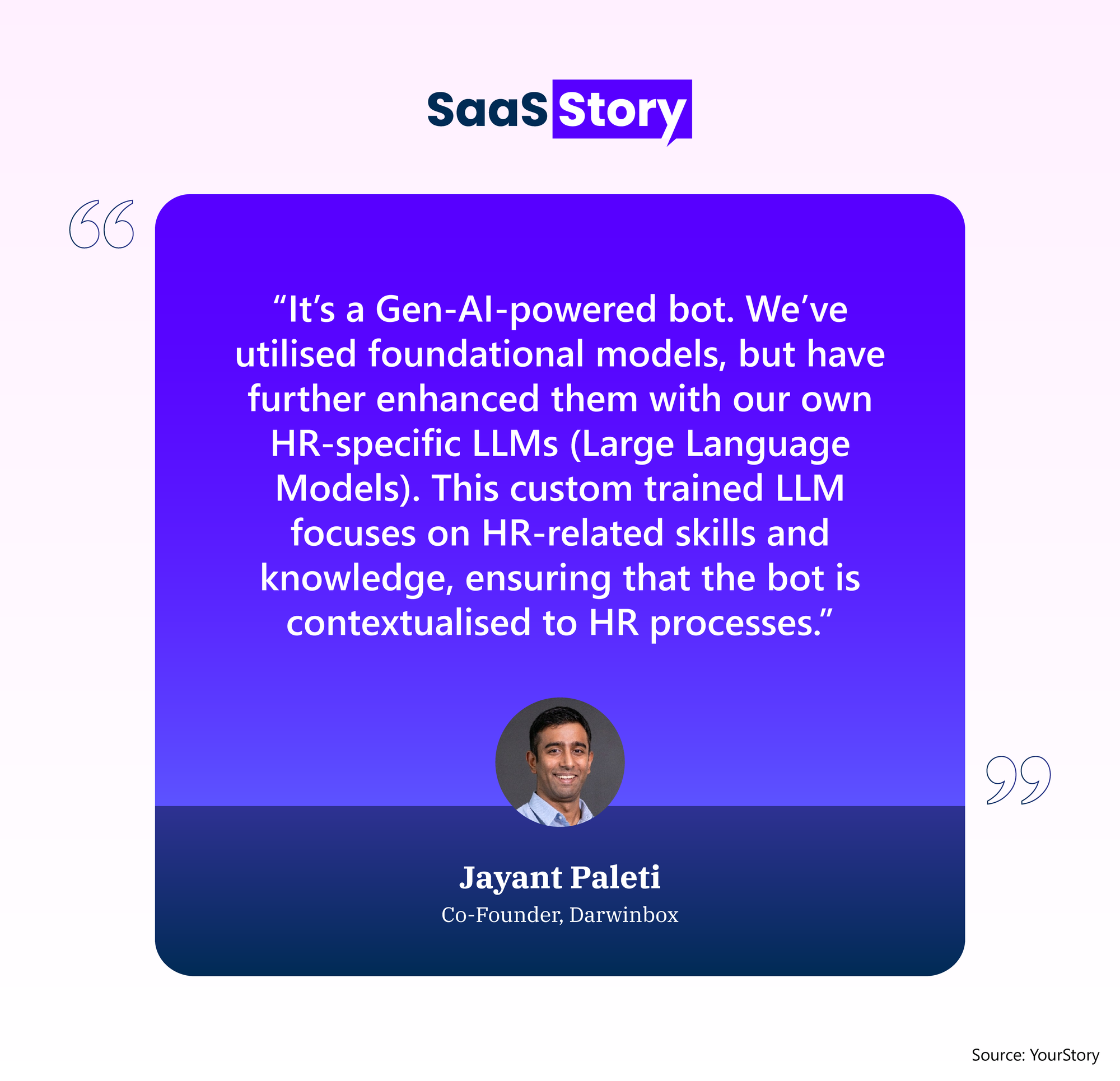
The company has also invested in inclusivity and scale. Its framework supports multiple Indian and international languages, from Hindi and Bengali to Bahasa, French, and German. Its mobile app, one of the lightest in the sector, was designed for accessibility in bandwidth-limited regions.
Payroll, too, has been rethought with the launch of an advanced system built on the RIVeR (Review, Initiate, Verify and e-approve, Release, and Report) framework.
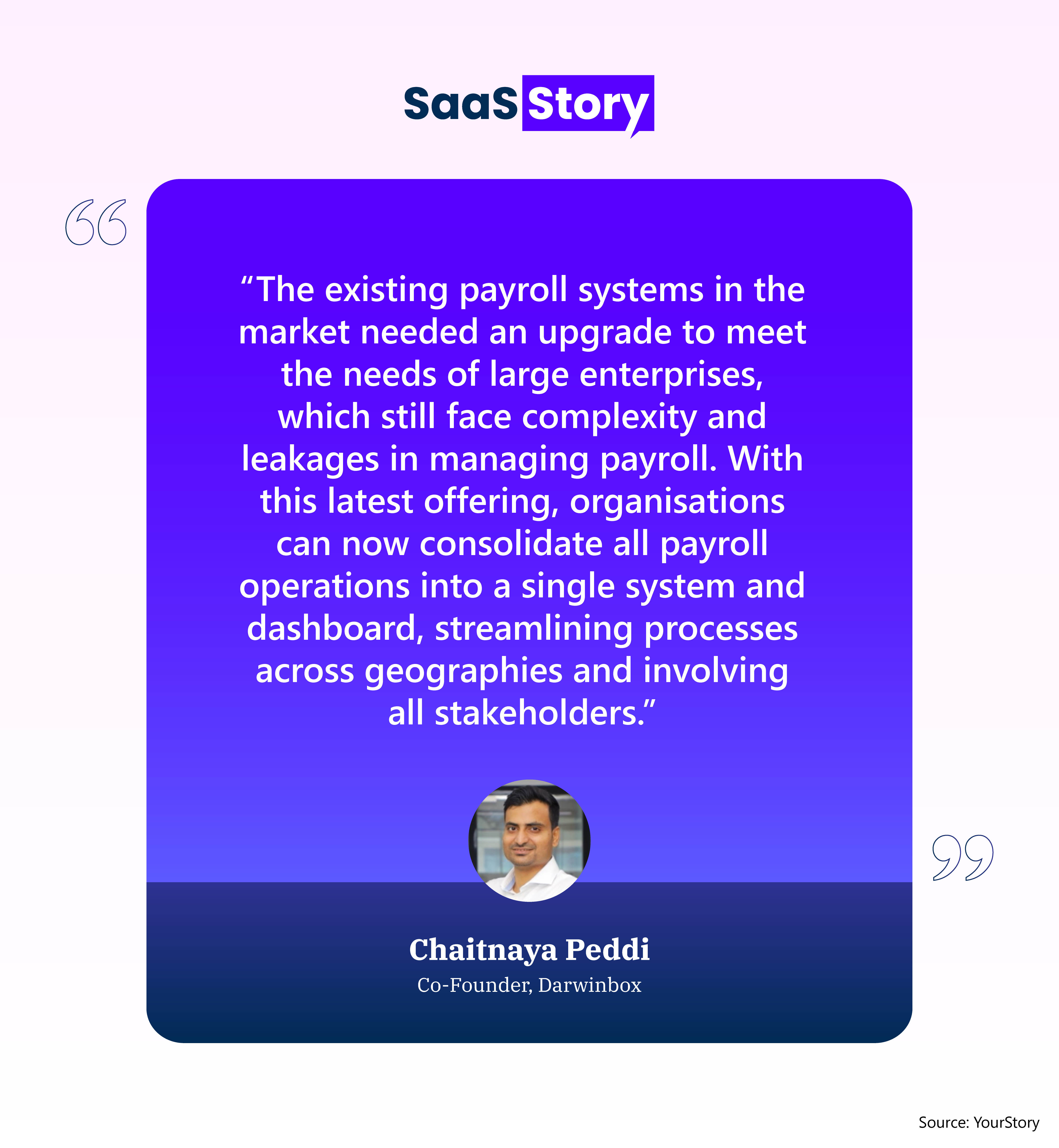
As a result, Darwinbox is now considered as not just an Asian success story, but a global HR-tech player, trusted by organizations across 130+ countries.
The company’s identity is also reflected visually in its brand logo. It is intentionally minimal, yet striking. A clean box symbol stands as its emblem, followed by the company name in its trademark blue-and-black color scheme. Much like the product itself, the design is straightforward but built to leave an impression.
Know the Four Minds behind Darwinbox
Every founder contributes a piece of themselves to the company they build. Similarly, Darwinbox carries the imprint of four entrepreneurs, each shaped by different backgrounds in education, careers, and ways of thinking.
Chaitanya Peddi grew up curious about systems and how they worked. At BITS Pilani, he studied engineering, then went on to XLRI Jamshedpur, one of India’s leading management schools. His career began at Deloitte, where he worked on human capital consulting.
Later, at Google, he saw technology at its sharpest edge. What struck him time and again was how much time HR spent on administration, and how little on people. He had the product mind of the group, always asking why workflows were so clunky, why software couldn’t just adapt to how humans behave.
Jayant Paleti brought with him the mindset of a consultant. An IIT Madras graduate who later studied at IIM Lucknow, he spent years at McKinsey & Company. Numbers, strategy, and boardroom debates made up his world. But beneath the surface was a restlessness.
He wanted to build, not just advise. He believed Indian companies could produce technology that matched global standards. For him, Darwinbox was not about merely fixing HR. It was more about showing that a company born in Hyderabad could take on Oracle or SAP and hold its ground.
Rohit Chennamaneni also studied at IIM Lucknow and worked at McKinsey, but later shifted to Google. He saw how new systems were introduced in businesses and how often they failed. Technology would arrive with immense promise, but employees struggled to adopt it.
Rohit reminded the team that usability mattered as much as features. In his view, a platform had to serve the manager in the factory, the HR head in a metro office, and the new hire logging in on day one. If it didn’t work for everyone, it wouldn’t work at all.
Vineet Singh was the quiet builder. Educated at IIT Guwahati, he spent time at IBM, Verizon, and Google, absorbing how complex systems could run at a massive scale. When he joined Darwinbox, he was not just adding another pair of hands, but shaping its engineering backbone, scaling teams, building product modules, refining features to meet real needs.
Even though their paths were different, all four saw the same gap: companies poured money into finance and sales technology, but HR remained overlooked. This, despite employees being the heart of any business. Fortunately, they decided to change the scene for good.
Early Struggles That Paved the Way Forward
As you can probably tell by now, the seed for Darwinbox was planted in quiet frustration. While working in a corporate firm, Jayant Paleti noticed how the HR department operated without a proper system to tie everything together. Conversations with Chaitanya Peddi and Rohit Chennamaneni revealed the same observation.
This common pain point turned into an idea, and soon the three friends were meeting every day in a small Hyderabad restaurant, sketching thoughts over endless cups of coffee and tea.
But dreaming wasn’t enough; they also needed to start building. The first step was research. They spent long nights studying the HR tech market in India, testing what was already out there, and learning where the gaps lay. Most platforms offered only pieces of the puzzle. What they wanted was a single system that could manage everything, from payroll and attendance to assets, insurance, and even employee learning.
The challenge was that creating something this wide was daunting. So, they were smart about it and started small with two important functions that every company needed, i.e., attendance and payroll. With no deep-pocketed backers at the time, the three of them pooled their own savings to get Darwinbox off the ground.
Winning customers was another uphill battle. HR leaders are typically a cautious lot. Naturally, for them, trusting a small startup with sensitive employee data was a risk. And of course, there was also competition: global giants already dominated the space. Convincing companies to switch meant countless demos, reworking features, and proving that their product was not only functional but also easy to use.
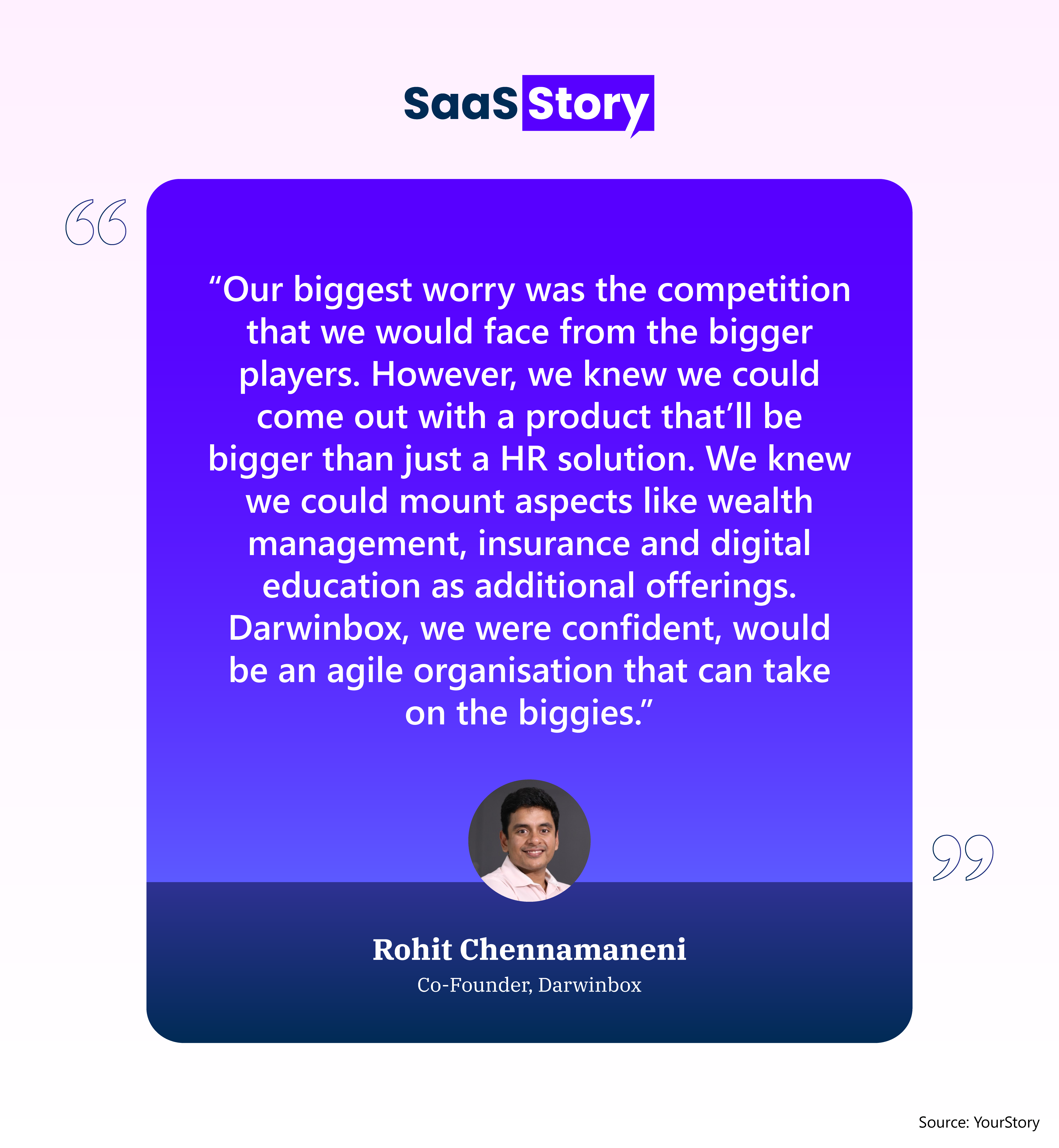
The financial side added more pressure. Investors were uncertain about HR technology. After all, it wasn’t as exciting as e-commerce or payments, and it would not really yield an ROI. It took months of pitching and rejections before they finally raised their first round in 2016: about INR 4 crores from Endiya Partners, 3One4 Capital, and a few others. That seed funding gave them breathing room and validation.
Through it all, they carried the personal weight of leaving stable jobs. Families and friends questioned their decision. The risk was real and so was the doubt, but they kept at it. For them, Darwinbox was never just a software project. It was their answer to a problem they had lived through themselves.
Step by step, the idea gained traction. One client led to another, and small wins turned into bigger ones. Years later, the same company that began as three friends debating over tea would be valued at over a billion dollars, becoming the 84th Indian startup to join the unicorn club.

Growth and Expansion: Milestones and Timeline
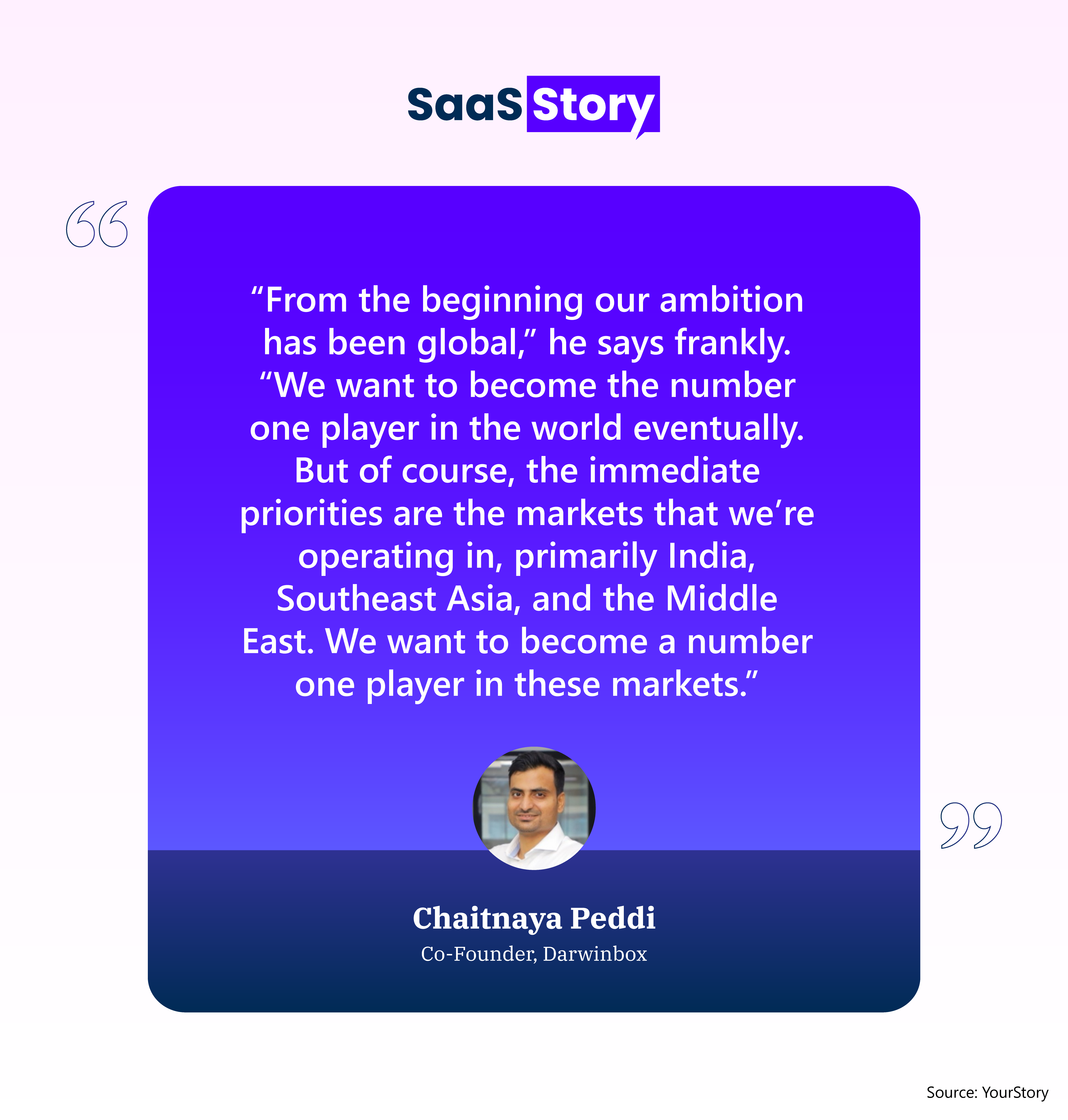
Success is rarely achieved overnight. It takes years of hard work and persistence to make it in the overcrowded startup world. Darwinbox navigated the rough waters and experienced many wins along its journey. Here’s a quick look at Darwinbox’s achievements through the years.
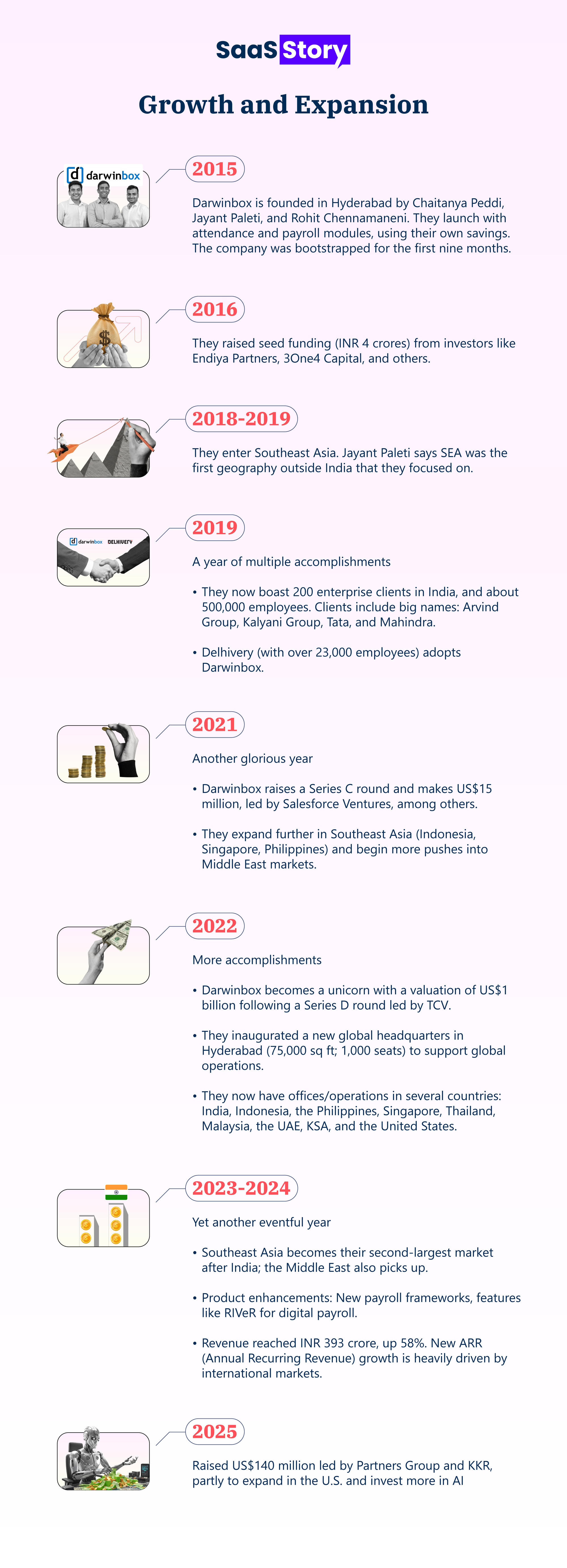
Today, they support over 1,000 enterprises, 4 million+ employees, in 130 countries. Some marquee clients globally include EXL, Virtusa, Nivea, WeWork, Zara, Starbucks, and Adidas. The list also includes big Indian conglomerates like Vedanta, Tata Cliq, NSE, Airtel, and so on.
Lessons from Darwinbox
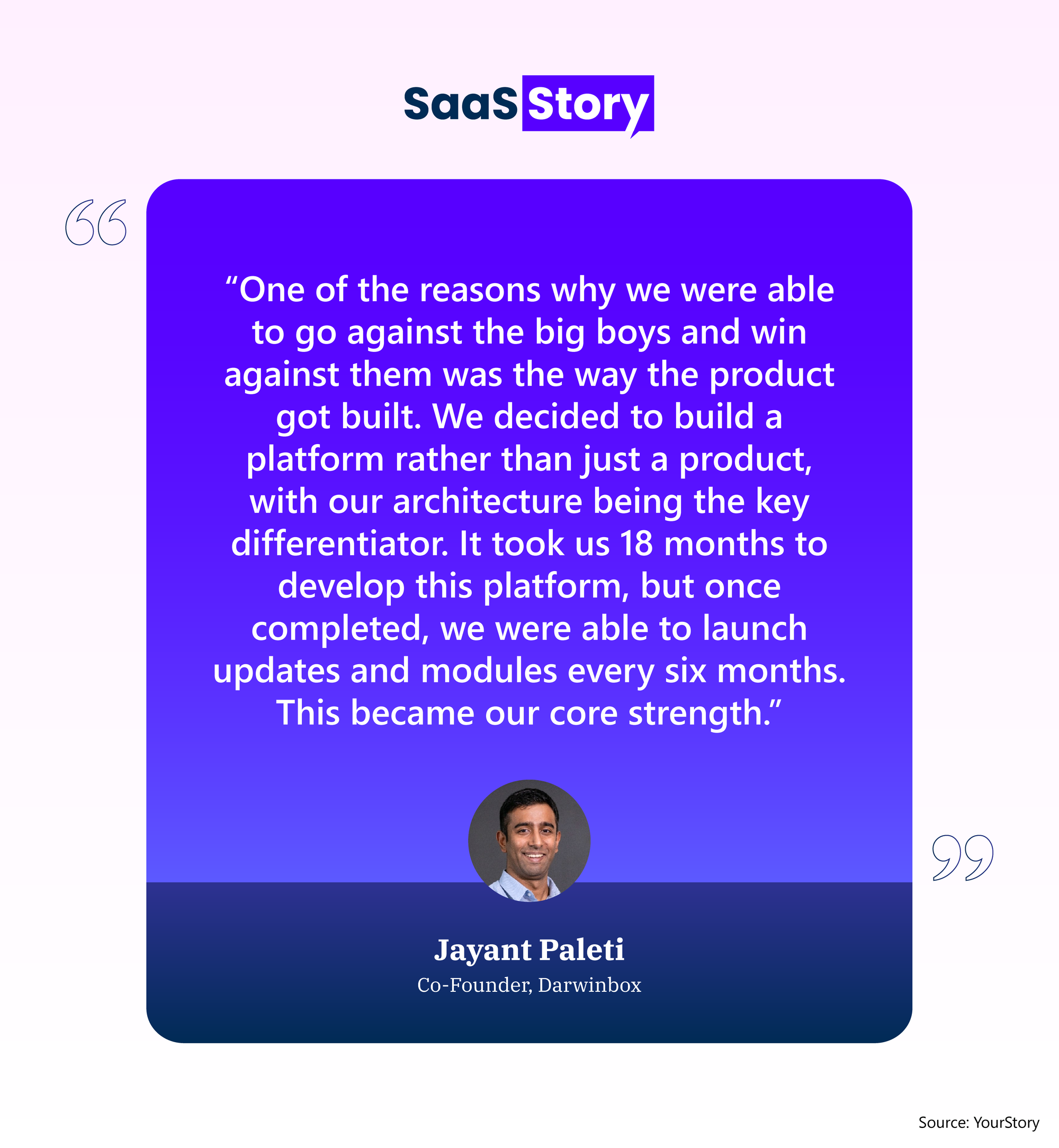
Darwinbox’s climb from three friends in Hyderabad cafes to a billion-dollar company is more than a success story. It gives aspiring B2B firms a blueprint for building products that last. Here are a few lessons worth learning from Darwinbox’s story.
Put the customer at the center.
Darwinbox won early traction by paying attention. The founders spoke with companies across industries, collected feedback, and designed tools that solved problems people actually faced. The mobile-first approach came out of this process.
They realized that employees needed something simple that they could access on their phones. B2B companies can take note: keep the dialogue with clients open, let them test features, and be willing to adjust until the product fits.
Let data guide decisions.
From the beginning, Darwinbox leaned on data to help clients make sense of their workforce. Their platform highlights patterns in productivity, attrition, and performance, making HR less about instinct and more about insight.
The broader lesson? B2B firms that invest in analytics can sharpen decision-making, track ROI, and prove value to their customers. Data isn’t just numbers; it’s trust in a measurable form.
Adapt to where you operate.
Darwinbox didn’t build products for a generic global market. They built for Asia, where companies are large, diverse, and layered with approvals. Payroll and compliance vary from country to country, and cultural nuances shape workplace policies.
By solving for this complexity, Darwinbox carved out a niche Western players couldn’t fill. For B2B firms eyeing expansion, the message is clear: know the ground you’re entering. Hire locally, study the rules, and design products that feel native.
Prove your value with real stories.
An effective way Darwinbox earned customer trust was by showing them exactly what worked. Case studies with companies like Tokopedia in Indonesia or JSW in India illustrated how the platform could handle both scale and diversity.
Sharing those stories wasn’t about promotion, but proof. For any B2B firm, showcasing real-world outcomes through testimonials, metrics, or detailed client journeys builds credibility faster than any pitch deck.
Choose the right partners.
Behind the product was a circle of strong backers: early believers like Endiya Partners, and later, global names like Sequoia Capital and Salesforce Ventures. These were more than just investors.
They became strategic allies who brought networks, expertise, and validation. The lesson for others: don’t just chase money. Find partners who see the long game and can help open doors.
Wrapping Up
Darwinbox’s progress isn’t just about building an HR platform. It’s about persistence, timing, and clarity of purpose. It started when three friends questioned outdated systems and eventually grew into a global company trusted by hundreds of enterprises worldwide. Its trajectory shows startups grow when they listen to customers, adapt to context, and back everything with proof.
Challenges were constant, but so was their conviction. Today, Darwinbox stands as a reminder that innovation need not cause disruption. Sometimes, it simply comes from listening, learning, and creating solutions that actually fit the world we live and work in.
Subscribe to our newsletter.
Be the first to know - subscribe today

